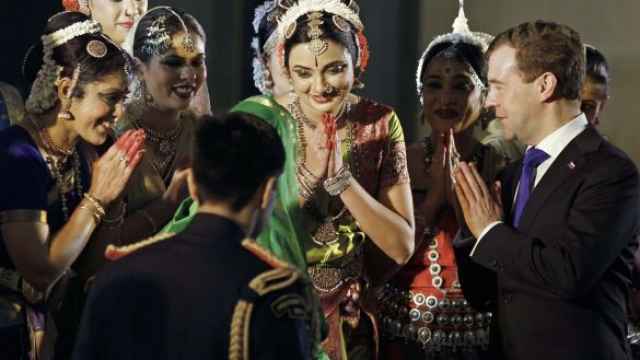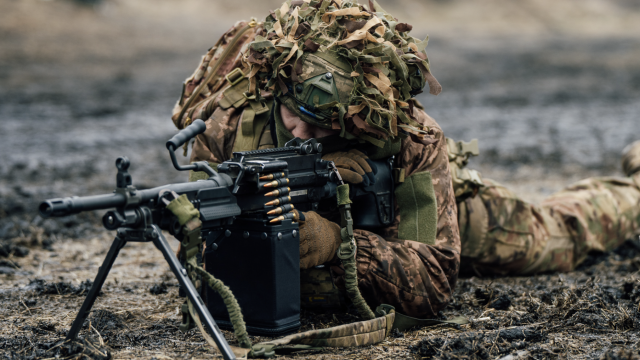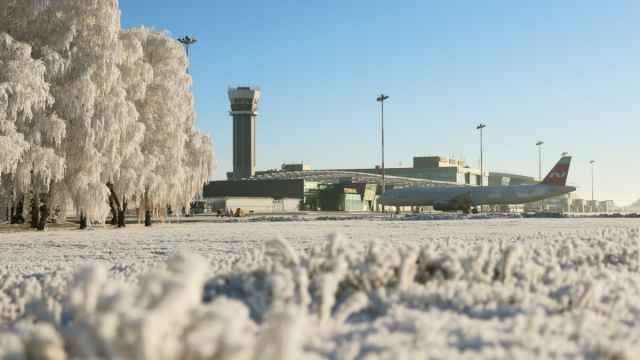MUMBAI, India — President Dmitry Medvedev's warm reception in India, including wrapping up a stealth jet fighters deal potentially worth $35 billion, dispels Russian fears that its former Cold War ally has turned to the West.
Indian Prime Minister Manmohan Singh, who has in the space of a few months hosted all the leaders of the five permanent members of the UN Security Council, said "Russia is a time-tested friend of India" at the start of Medvedev's two-day trip on Tuesday.
"In the past few weeks, a number of heads of state have made visits to India," Foreign Minister S.M. Krishna said Wednesday in New Delhi. "India has emerged as one of the fastest and [most] powerful economies, with plus 8 percent [gross domestic product] growth rate.
"In the whole world, only India and China could withstand the recession in the past. This shows the resilience of India and its increasing role in world politics and economy," he said.
Russia has been India's close economic and political partner since Soviet days and monopolized India's defense market for decades, but India has been steadily reducing its reliance on one country to reflect its growing influence on the world stage.
"President Dmitry Medvedev has done well to dispel the growing misperception that Indo-Russian relations have lost their salience amidst India's new warmth with the U.S. and the West," the Indian Express newspaper said in an editorial.
Medvedev spent his last day in India visiting the Taj Mahal in Agra, meeting students in Mumbai and touring Bollywood film studios, a big export industry to Russia.
Medvedev, a photography buff who frequently posts his own photos on the Internet, took pictures of the 17th-century monument dedicated to love, RIA-Novosti reported.
"The Taj Mahal is a unique achievement of mankind," Medvedev wrote in the guest book. Russia joined the United States and France in offering support for India for a permanent seat at an expanded Security Council to reflect the growing might of emerging economies.
India says a seat on the Security Council would reflect the Group of 20 nation's importance as its $1.3 trillion economy helps spur global growth and its government exerts more and more influence over issues from Doha trade to climate talks.
Reform is unlikely to happen quickly, however, with China decidedly lukewarm about admitting its regional rival to the UN top table.
India's growing ties with the United States, underscored by a landmark civil nuclear deal, has made Russia ill at ease.
India, the second-fastest-growing major economy in the world after China, is one of the top arms importers and plans to spend about $50 billion on defense in the next few years to upgrade its aging Soviet-era arsenal, mainly to counter a perceived China threat.
World leaders, accompanied by top executives, are hungry to secure a slice of India's largely undeveloped economy, expected to grow at near-double digit rates for the next decade, making it one of the five largest economies in the world by 2020.
Russia has long seen India as a counterweight to China and a potential ally in Afghanistan.
"The strategic, economic and political importance of Russia can not be overstated," said Bhaskar Roy, a New Delhi-based strategic affairs columnist.
"India needs Russia for its energy requirements, to counter-balance China, for retaining influence in Afghanistan once the Western troops leave, for influence in energy-rich Central Asia, and generally for support and backing at all major international fora. India needs Russia to realize its ambitions, global goals," Roy said.
No details were given as to the size of the potential aircraft deal between Russia and India, but both countries have in the past talked about producing 250 to 300 such fighters over 10 years, unofficially said to be worth about $35 billion.
"That in turn has enormously increased India's bargaining power with the U.S. and European suppliers of advanced conventional weapons," the Indian Express said.
Boeing's F/A-18 Super Hornet, France's Dassault Rafale, Lockheed Martin Corp's F-16, Russia's MiG-35, Sweden's Saab JAS-39 Gripen and the Eurofighter Typhoon are competing for a separate order from India for 126 fighter jets, valued at about $10.4 billion.
India and Russia agreed to open talks on building a third and fourth reactor for a nuclear power plant in India's southern state of Tamil Nadu, but failed to sign a firm deal because of Russian concerns over a recently passed liabilities bill.
A Message from The Moscow Times:
Dear readers,
We are facing unprecedented challenges. Russia's Prosecutor General's Office has designated The Moscow Times as an "undesirable" organization, criminalizing our work and putting our staff at risk of prosecution. This follows our earlier unjust labeling as a "foreign agent."
These actions are direct attempts to silence independent journalism in Russia. The authorities claim our work "discredits the decisions of the Russian leadership." We see things differently: we strive to provide accurate, unbiased reporting on Russia.
We, the journalists of The Moscow Times, refuse to be silenced. But to continue our work, we need your help.
Your support, no matter how small, makes a world of difference. If you can, please support us monthly starting from just $2. It's quick to set up, and every contribution makes a significant impact.
By supporting The Moscow Times, you're defending open, independent journalism in the face of repression. Thank you for standing with us.
Remind me later.





